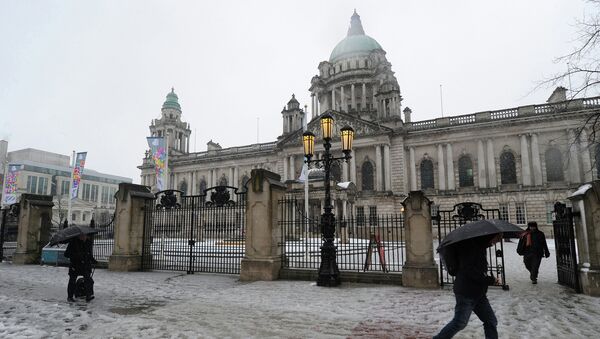The human rights organisation, and the surviving suspects known as the ‘hooded men’ demanded the inquiry. It was an emotional plea from a group of men who say they have suffered injustice for more than four decades.
On Friday afternoon, 10 of the surviving group gathered at the Stormont Hotel in Belfast and echoed calls by Amnesty International for an investigation into their treatment during their internment. Earlier in the week the Irish government asked the European court of human rights (ECHR) to revise its judgment in the case.
The ECHR application arose after new evidence in a documentary by Irish national broadcaster RTE revealed British National Archive documents showing a decision had been taken at UK Cabinet level to use torture methods during internment operations in 1971.
The 14 so-called ‘Hooded Men’ had reportedly been subjected to extreme interrogation techniques which the ECHR found in 1978 to be inhumane and degrading treatment — but not torture.
Facts Must Be Clarified
The surviving men gathered in Belfast for a private meeting with Thomas Hammarberg, who led Amnesty's research delegation to Northern Ireland in 1971 to investigate abuses.
Mr Hammarberg said: “Time does not heal all wounds, if justice is not done. I was deeply disappointed when the European Court of Human Rights concluded that the ill-treatment of detainees in Northern Ireland under emergency powers in the early 1970s did not amount to torture. Similar methods have since then been used against suspects not least during the US-led war on terror.
“Now that an application has been made by Ireland to revisit the judgement, it should be in the interest of the UK government, as a signatory of the UN Convention against torture and the European Convention on Human Rights, to ensure that the facts be clarified in this critical case.”
It was alleged that the men, arrested under the policy of internment in 1971, were taken to a secret location, which has since been confirmed as Ballykelly Army base where they were subjected to what was called "deep interrogation".
The British Army referred to this as "the five techniques", which included being beaten, deprived of sleep, food and water, and forced to stand in a stress position against a wall for long periods.
None Were Convicted
One of the protagonists of the group, Liam Shannon, told the RT news channel: “We never expected that a government would torture its own citizens and that’s exactly what happened. We were hooded from the word go.
“We were put into helicopters and told that we were hundreds of feet in the air, and thrown out just to find that we were 3 or 4 feet off the ground.
“We were kept hooded, we were beaten. If we couldn’t stand against the wall any longer… and if you attempted to get off the wall you were severely beaten and put back up again.”
While all of the men were interned, none was ever convicted.
However Britain’s Ministry of Defence has consistently rejected allegations that it used torture and that it ‘always co-operated’ with statutory inquiries.
In a statement, a Northern Ireland Office spokesperson said: "When the case was heard back in the '70s, the UK government did not seek to justify treatment experienced by the individuals commonly referred to as 'the hooded men'.
"These events took place many years ago. This government adopted a Strategy for the Prevention of Torture in 2011 and this remains one of our global human rights priorities.”
Peace Process Should Not Be Affected
Patrick Corrigan is Amnesty International’s Northern Ireland Programme Director.
"The allegations against the UK are extremely grave: that they tortured their own citizens, knowing full well the long-term effects of the abuse, that this was authorised at the highest levels of government, and that they then deliberately misled the European Court of Human Rights.
"The Irish government has done the right thing by referring this case back to the European Court. The spotlight now falls on the UK and its obligation to deliver an independent and effective investigation into the allegations," he says.
However Amnesty is keen to ensure that talks over the Northern Ireland peace process would not be affected by the case.
“We earnestly hope there will be no suggestion that Ireland’s decision may undermine the wider Northern Ireland peace process. As we have repeatedly communicated to the Irish Government, there can be no stable and lasting peace in Northern Ireland without truth and justice, including in this case," Mr Corrigan said.
The judgment has set a legal precedent for international law on torture.
The Irish foreign affairs minister, Charlie Flanagan, said he took the decision to go back to the ECHR following a review of thousands of documents.
Ireland's application was completed this week, six months on from the RTE broadcast and then lodged with the ECHR.


